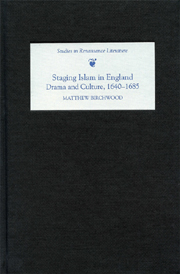Book contents
- Frontmatter
- Contents
- List of illustrations
- Acknowledgements
- Introduction
- 1 Cultural Encounters between England and Islam in the Seventeenth Century: A Topography
- 2 Framing ‘an English Alchoran’: The Famous Tragedie of Charles I and the first English translation of the Qur'an
- 3 Orienting the Monarch: Tyranny and Tragedy in Robert Baron's Mirza and John Denham's The Sophy
- 4 Turning to the Turk: Collaboration and Conversion in William Davenant's The Siege of Rhodes
- 5 Toleration, Trade and English Mahometanism in the Aftermath of Restoration
- 6 Plotting the Succession: Exclusion, Oates and the News from Vienna
- Conclusion: ‘If we our selves, would from our selves exam'ne us’
- Bibliography
- Index
- Studies in Renaissance Literature
2 - Framing ‘an English Alchoran’: The Famous Tragedie of Charles I and the first English translation of the Qur'an
Published online by Cambridge University Press: 12 September 2012
- Frontmatter
- Contents
- List of illustrations
- Acknowledgements
- Introduction
- 1 Cultural Encounters between England and Islam in the Seventeenth Century: A Topography
- 2 Framing ‘an English Alchoran’: The Famous Tragedie of Charles I and the first English translation of the Qur'an
- 3 Orienting the Monarch: Tyranny and Tragedy in Robert Baron's Mirza and John Denham's The Sophy
- 4 Turning to the Turk: Collaboration and Conversion in William Davenant's The Siege of Rhodes
- 5 Toleration, Trade and English Mahometanism in the Aftermath of Restoration
- 6 Plotting the Succession: Exclusion, Oates and the News from Vienna
- Conclusion: ‘If we our selves, would from our selves exam'ne us’
- Bibliography
- Index
- Studies in Renaissance Literature
Summary
WRITTEN IN THE WAKE of the execution of King Charles I, The Famous Tragedie reconstructs the events of the Second Civil War, from the death throes of royalist military resistance at the Siege of Colchester (June–August 1648), up until the moment of regicide. The publisher and bookseller George Thomason, also an assiduous collector of contemporary publications, added the pamphlet play to his collection on 26 may 1649, barely four months after the king's death, allowing the date of publication to be pinpointed with relative accuracy. The topicality of the action points to the dual status of The Famous Tragedie, partially informed by the conventions of printed dramatic texts, but also clearly participatory in the propaganda wars waged in print, munitioned by the salvos of newsbooks, broadsides, sermons and tracts that poured from the presses in the 1640s. The generic ambivalence of the text further arises from the particular conditions of authorship in which the anonymous playwright-pamphleteer operates. As recent studies of the literature of the English Civil War have emphasised, following the closure of the playhouses in 1642, the drama was not simply strangled out of existence, but driven underground, adapted and reformulated. Deprived of legitimate arenas of performance, the dramatic form increasingly found expression in the pamphlet literature, harnessing the currency and vitality of a newly liberated print culture in order to reach its audience. Temporarily emancipated from the control of the Stationers' Company following the abolition of Star Chamber in July 1641, the press enjoyed a short period of untrammelled activity that would permanently transform the nature and pervasiveness of printed texts in relation to the political and literary expression of English society.
- Type
- Chapter
- Information
- Staging Islam in EnglandDrama and Culture, 1640–1685, pp. 52 - 68Publisher: Boydell & BrewerPrint publication year: 2007



